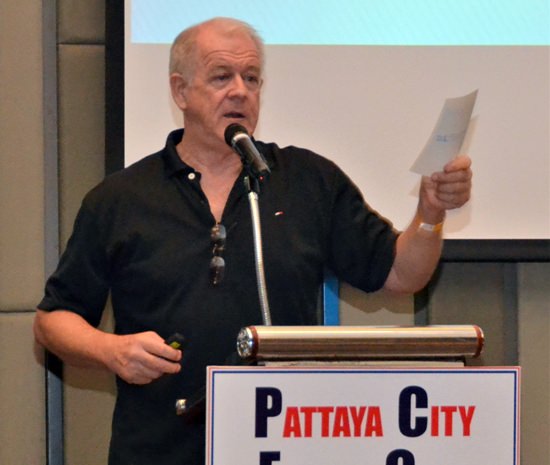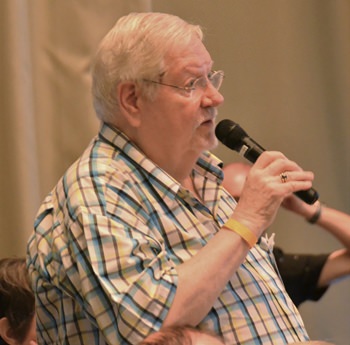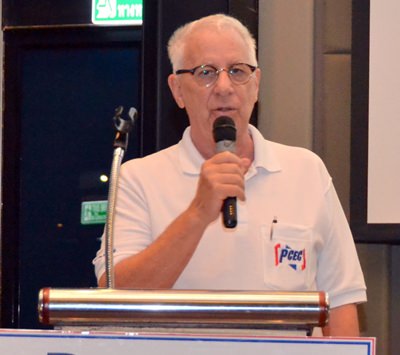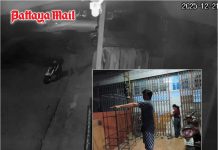
MC Richard Silverberg introduced the guest speaker, fellow member Kelvin Bamfield. Kelvin is the CEO of Thai888 Law Co. Ltd. His presentation was about Avoiding and Overcoming Will and Probate Problems in Thailand. Kelvin started by describing his company’s location and organization. It has been 12 months since PCEC Member Lawrie McLaughlin departed from us. As Kelvin handled Lawrie’s estate, he dedicated his talk to Lawrie’s memory.
Kelvin has lived in Thailand for over 18 years. He holds Australian Degrees, Diplomas and Certificates from the University of Technology, the University of Sydney, and several other organizations. After 8 years of retirement in Thailand, Kelvin returned to the work place to act as the CEO for Jeab Supaporn, the owner / director of Thai888 Law Company. Thai888 Law has grown and now has 2 offices in the View Talay 5 D Building, and 9 staff (lawyers, notaries and paralegals).

A will is insurance to ensure your wishes are carried out to the letter of the law. The will instructs the executor how you would like your body and assets handled should something happen to you. In your will, you state who you are, what assets you have, and who they should go to. Do you want a cremation, burial, repatriation, ashes in the sea etc.? If you do not have a will then things might get very messy with many more court proceedings as the law considers you intestate and sets out to whom, in priority order, your assets will be given.
Kelvin outlined ways to plan for probate and ways that minimized many legal issues and delays. Three recent probate case studies were examined in detail. Kelvin noted that he had permission from the next of kin to include them in his public presentation.
As people travel through life they create an identity and accumulate assets & debts e.g. bank accounts, loans, mortgage, pension plans, and life/property insurance. These assets & debts must all be addressed by the court. If you die in Thailand, the first order of business is to obtain the death certificate. You must also notify the deceased’s embassy who will, if necessary contact your next of kin.
Thai law is that the will and the executor must go to a Thai court. Probate is the legal process whereby a will is “proved” in a court and accepted as a valid public document that this is the true last testament of the deceased. The granting of probate is the first step in the legal process of administering the estate of a deceased person, resolving all claims and distributing the deceased person’s property/assets under a will. If the will is not in Thai, it must be translated to Thai so the court will accept it.
He noted that if you have a properly drawn will naming an executor, it will make the process simpler and, thus, less costly. It will also help to ensure that your assets go to the individuals and in the amounts you wish. Kelvin also strongly suggested that if you have assets in Thailand and in your home or other countries, that you do a separate will for each country and that they cover only the assets you own in that country.
One of his case studies had to do with making a proper will in general as it dealt with his own mother’s will with probate in Australia. He noted there were several deficiencies, especially in there being more than one document and they having different dates.

Another case study, dealt with a handwritten will, which is legally valid in Thailand. However, if any part is “typed” and not handwritten, it must then have the signatures of two witnesses. In the case study, the will did require two witnesses, but there was only one. Thus, the court ruled it was invalid and the deceased died intestate. Thus, probate became a lengthier process.
The third case study dealt with a US Citizen who died in Thailand with no will. He was also hiding assets all over the world from the IRS and had two passports and two identities. But he had no “black book” with codes (e.g., passwords), addresses, or other information to trace the assets. Consequently, he has land and other assets that as executor, he Kelvin, cannot touch so they can be distributed to his heirs. Kelvin strongly suggested that you have this type of information written somewhere and placed where it is secure but can be located when you die.

After answering many questions from members and guests, MC Richard Silverberg then brought everyone up to date on current events. This was followed by the “Open Forum” portion of the meeting, where questions are asked and answered and comments made about expat living in Thailand. For more information on the Club and their activities, visit www.pcec.club.
 |
 |





